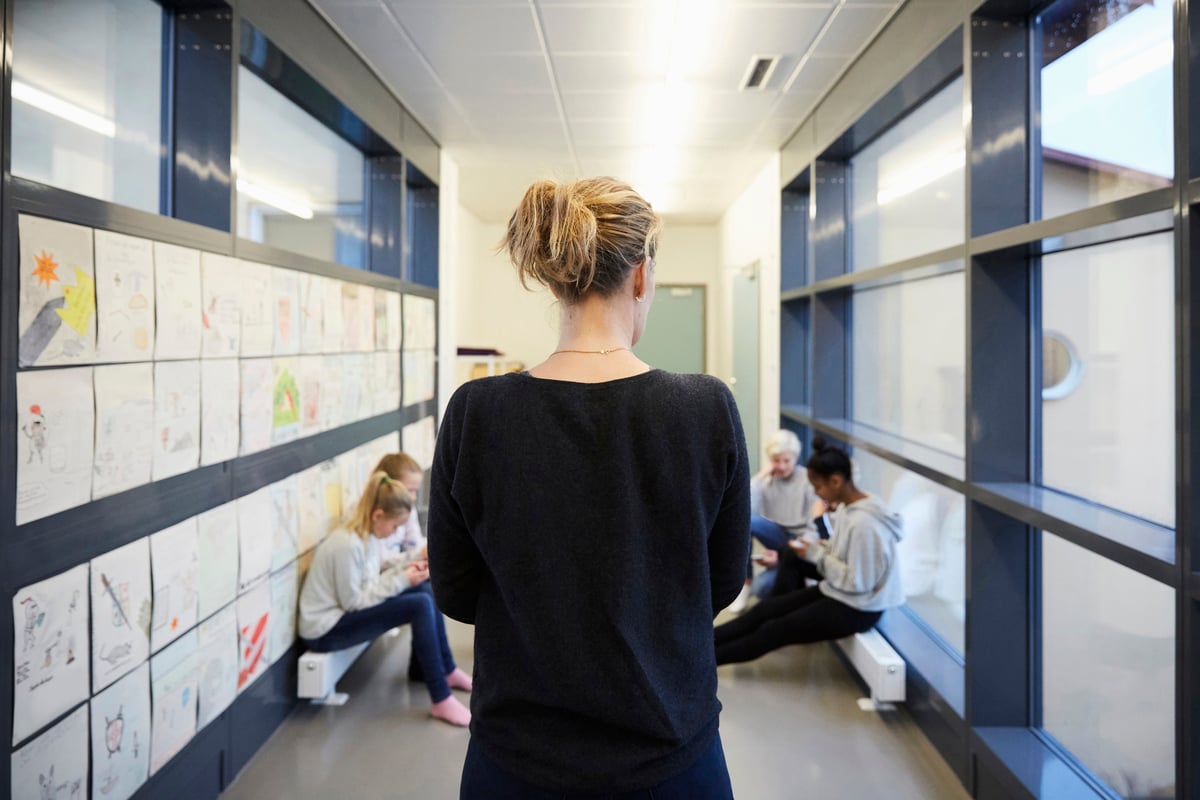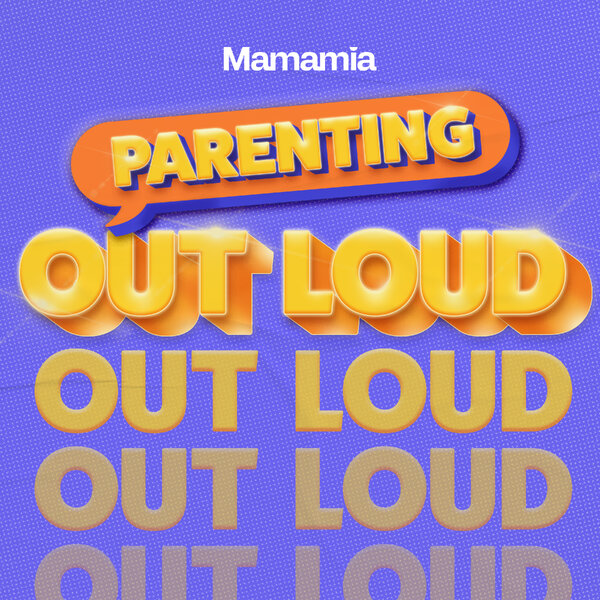
In 2024, there's one thing that's become alarmingly apparent: No one knows how to behave anymore.
And it's not our fault. After all, we were locked inside for basically two years.
In Mamamia's Modern Australian Etiquette series, we're asking people in different fields to share their hard-line dos and don'ts, according to their expertise.
And now it is the teachers' turn.
We asked primary and high school educators to tell us all the things that parents do that get on their nerves. And they didn't hold back.
So listen up, parents — here's a list of everything teachers want to you to kindly stop doing.
1. Talking about teachers and schools online.
"I’m a teacher and a mum. I’m in a Facebook group for the parents in my child’s class. I hate that these groups are used to talk about teachers, their decisions, their teaching or the school in a ‘private’ space behind their back. This group creates polls about behaviour management techniques, or the reading program, for parents to vote on so that a parent can go to the teacher and say 'everyone thinks this'. It really bothers me. I think if you have a concern about something, speak to the teacher, don’t go gathering an army of parents for every little thing. Teachers are doing the best they can (mostly) and deserve the respect of being treated like professionals and not gossiped about." - Clare.
"Don’t put anything in a Facebook group or chat that you wouldn’t say to the teacher’s face. If it’s in writing somewhere, chances are they’ll see or hear of it, and it is so demoralising." - Michelle.
"Don't believe school reviews on social media community pages. It's usually a handful of 'interesting' parents that are unhappy. You can work your guts out all day trying to do your best and two or three parents just tear your school down. It's heartbreaking and you can't say anything back to defend the school." - Jo.
Watch: To teachers everywhere. Post continues below.
2. Poor communication that is 'urgent' or angry.
"Please don’t email me during the school day to ask me to check if your child is cold so that you can bring them a jumper. I probably won’t see it until the end of the day. I know we are all busy, but if an issue is concerning you enough to send an angry email, take the time to make a phone call or come and see us for a meeting. Harsh, angry emails upset us because we are always trying our best." - Rebecca.
"Please don't email and expect a response from me during the school day. I barely get to look at my computer to check emails because I am teaching your child!" - Kate.
"Please don't get cranky when we don't respond to an email during school hours. Sadly, we rarely have time to eat or use the toilet, let alone respond to emails. Also - please don't request a 'quick chat' when you drop your child off in the morning or during a lesson when we are teaching. These chats are never quick or straightforward." - Hannah.
"Please don’t try to have a meeting at the classroom door while the teacher is trying to get ready for the day with the kids. If they say, 'Let’s have a meeting,' accept and move on." - Brodie.
3. Don't ask teachers to solve your kids' social media issues.
"If you allow your child to have social media, please don’t ask me to sort out issues that have occurred between your child and another child on social media." - Rebecca.
"We spend so much time sorting out social media issues that did not occur on school grounds. Parents just handball it to teachers and then expect a full investigation. It’s so time consuming and exhausting." - Melissa.
4. Not believing the teacher's version of events.
"Please give us the respect of believing us when we tell you what happened. No, your child is not always telling you the truth. No, you cannot always tell when your child is lying." - Rebecca.
"Please stop saying, 'My child would never do that.' Be open to the idea that, outside of your care, your child may act or behave differently. Equally, please stop saying, 'Well it wasn’t my child’s fault.'" - Kate.
"Please don't believe EVERYTHING your child says happens — in the classroom, in the playground or on the oval." - Hannah.
"Please don’t believe everything they tell you verbatim. Little kids can be egocentric and can only tell you about things from their point of view. They may not be intentionally lying but they may not tell you the whole story regardless." - Carla.
"Please don’t email me saying your child doesn’t have to do the detention or other consequences for their behaviour. Please remember that children don’t want to disappoint or upset their parents so the version they tell you is almost always not the whole truth." - Anna.
5. Bringing takeaway to school for lunch.
"Stop bringing in McDonald's at lunchtime for your child! Or hot chips for them and a ‘few friends.’ You drop the food and leave as a hero; I deal with the unnecessary fallout/division. Kids go home and put pressure on their parents - 'Why don’t I get maccas and so and so does?’ etc. Then there are the friendship dramas over who were the ‘chosen friends’ deemed worthy of hot chips. It's the last thing we need!" - EJ.
6. Not allowing your kid to be independent.
"Please stop carrying your child’s belongings for them and then unpacking for them. Your child needs a sense of independence and awareness of where their things go in the classroom. You don’t need to be able to find it - they do!" - Kate.
"Please stop bringing in items that were left behind at home. It disturbs the teaching staff and students, and means your child will not learn preparedness and consequences in a safe space." - Lynn.
"Stop texting and phoning your kids in school hours!" - Amie
"I am not responsible for finding your child’s jumper, drink bottle, pencil case, reader... And I did not study for over four years in teaching pedagogy and theory to spend my days policing what your child eats or does not eat during lunch and recess." - Carla.
Listen to this episode of The Quicky about why so many teachers want to quit. Post continues below.
7. Moving your kids around too much.
"Please try not to move your kids from school to school. Give your child a chance to settle and find a community!" - Kate.
8. Being an events planner.
"Please don't ask us to orchestrate ANYTHING related to your child's birthday party. I've been asked to hand out invitations, chase RSVPs and alter the invites with my knowledge of a child's dietary requirements." - Hannah.
9. Constantly undermining our decisions.
"Please don't query why your child is in their assigned literacy/numeracy group, when you think they should be in another group with all the 'smart kids' because they are so clever." - Hannah.
"Please do not question my integrity or decisions in a public forum like Facebook, outside my classroom door or in front of your child. If you show me disrespect, so will they." - Carla.
10. Making excuses about homework.
"Please stop whining about how you are too busy to complete any homework, even when it's just five minutes of reading at night." - Hannah.
"Learning occurs outside of the classroom too. Provide opportunities for them to read, write and work mathematically. Don't wait for homework to be given — learning should be fun and relevant to their home life, not a chore." - Jessica.
11. Allowing sick kids to go to school.
"Please, when your child says, ‘I feel sick and don’t want to go to school today’, don’t say to them, ‘If you feel sick, tell the teacher and I’ll pick you up.’ Nine times out of 10, this then becomes their immediate plan for the day - complain to the teacher, call Mum/Dad, get picked up, go home." - Rachel.
And finally, here's what teachers want from parents....
12. Please be kind.
"Please just be kind and decent. You have no idea what my day has been like. Teaching has been so tough in the past few years; we take on so many of the traumas and burdens our kids suffer and some days that load is overwhelming." - Carla.
"Do not underestimate the impact of a simple letter of thanks. Feeling appreciated makes a HUGE difference to how I feel about my job and my life choices. These small tokens of gratitude are like 'power ups' for teachers; they give us the energy to keep going and remind us that we are making a difference, even when it feels like we aren't. Many teachers treasure little letters of gratitude and we keep them in our drawers to re-read when having tough days." Rachael.
"Don’t feel the need to give us material gifts. Do say thank you or write a little note to express your gratitude. Those are the things I treasure and re-read when I need reminders of why I do the job." - Laura.
Feature Image: Getty.
This piece was originally published in September 2023 and has been updated.
Love to snack? Complete this survey to go in the running to win a $50 gift voucher!


